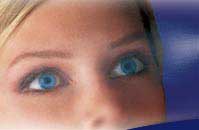New Research Supports Sharon Kleyne Hour Belief that Computer Eye Strain Is a Form of Dry Eye
Japanese Study Indicates Decreased Tear Film Mucin Levels in Dry Eye Similar to Computer Eye Strain Mucin Levels
New research supports what radio host and water researcher and entrepreneur Sharon Kleyne has been teaching for years - that computer eye strain is a form of dry eye disease with similar symptoms resulting from similar physiological changes in the eyes' tear film. The Osaka, Japan study, comparing levels of the tear film's mucin protein "5AC," was reported in a recent Reuters/Yahoo News article.
|
FREE SHIP OFFER ENDS 07/29/24 COUPON CODE LP891 CLICK HERE NOW TO SAVE |

|
Sharon Kleyne hosts the globally syndicated Sharon Kleyne Hour Power of Water® radio show, heard on VoiceAmerica and Apple iTunes. Kleyne is Founder of Bio-Logic Aqua Research, a fresh water, atmosphere and health research, and product development center. Natures Tears® EyeMist®, a 100% pure water mist, is the Research Center's global signature product for dry eyes and computer eye strain.
Computer Eye Strain, also called "Computer Vision Syndrome" or "CVS," according to Kleyne, is extremely common and affects a growing percentage of the population.. On numerous Sharon Kleyne Hour radio shows, Kleyne had taught that because symptoms of computer eye strain and dry eye disease are so similar, their treatment should also be similar.
Kleyne's research indicated that working at a computer screen causes the rate of reflexive eyelid blinking to decrease significantly, exposing the water content of the eye's protective tear film to increased evaporation. The surface of the eye is 98-percent water. Dry eye disease also involves a decrease in tear film water content, caused either by evaporation, fever or tear gland malfunction.
The new study suggests that additional similarities exist between computer eye strain and dry eye. The Osaka study involved the mucin protein "5AC,".a component of the tear film's "mucin layer" that helps the watery tear film adhere to the ocular surface. "5AC" is one of many mucin layer proteins. The mucin layer, according to Kleyne, gradually blends into the overlying and much thinner "aqueous" or water layer. Above the aqueous layer, the very thin "lipid" or oil layer helps slow aqueous layer evaporation.
The Osaka Study discovered that individual with diagnosed dry eye disease have much lower levels of 5AC in their tear film than individual without dry eye. Dry eye subjects averaged 3.52 nanograms of 5AC per milligram of protein versus 8.2 for non-dry eye subjects.
The same measurement, when applied to frequent computer users versus less frequent computer users, produced results similar to those for dry eye versus non-dry eye Osaka Study subjects who worked at a computer screen more than seven hours a day averaged 5.9 nanograms of 5AC per milligram, while those working less than five hours a day averaged 9.6..
Symptoms of both conditions, according to Kleyne, include eye discomfort, blurred vision, headache, increased stress levels, sleep disturbance and decreased productivity.
Kleyne's suggestions to reduce and prevent computer eye strain:
Above all, says Kleyne, drink at least eight glasses of water every day in addition to all other fluid intake. Caffeine and alcohol are dehydrating and should be avoided.
Other Kleyne suggestions: Eat eye healthy foods, and get sufficient exercise and sleep. "Eye foods" include dark green leafy vegetables and foods rich in omega-3 fatty acids. Keep an air humidifier, plants and/or an open container of water near your desk. Humidifying the air reduces tear film water evaporation.
Also, try to blink more often, taping a reminder to the computer if necessary. When working at a computer, the eyelids' reflexive blink rate can drop from 30 blinks per minute to as low as three blinks per minute. Reduce screen glare by adjusting window blinds and repositioning the computer. Turn off fluorescent lights and switch to a desk lamp. Use a flat-panel screen if possible.
In addition, Kleyne suggests, periodically throughout the day, maintain tear film water content by humidifying the air around the eyes with a pH balanced (below 7.0), fine-mist fresh water eye spray. Humidifying the air around the eyes is the intended purpose of Kleyne's Bio-Logic Aqua Research product Nature's Tears® EyeMist®.
Sources:
"Compute eye strain affects 90% of computer users warns Sharon Kleyne Hour host," PR Web, June 6, 2014; http://www.prweb.com/releases/2014/06/prweb11922128.htm
Doyle, K, "Staring at screens all day linked to changes in eye secretions," Reuters/Yahoo News, June 16, 2014; http://news.yahoo.com/staring-screens-day-linked-changes-eye-secretions-185422260.html;_ylt=AwrSyCRU0qFTKE8ALTnQtDMD
Uchino, Y, MD, et al, "Alteration of tear mucin 5AC in office workers using visual display terminals: The Osaka Study," JAMA Ophthalmology, June 5, 2014;. http://archopht.jamanetwork.com/onlineFirst.aspx
Sharon Kleyne History |
Sharon Kleyne Discover More |
|
Sharon Kleyne Press Release |
Sharon Kleyne Health Tips |








